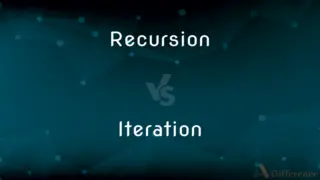Angler vs. Pirate — What's the Difference?
By Fiza Rafique & Maham Liaqat — Updated on May 13, 2024
Anglers focus on fishing as a sport or hobby, often using specific techniques and gear, while pirates engage in acts of robbery or criminal violence at sea.

Difference Between Angler and Pirate
Table of Contents
ADVERTISEMENT
Key Differences
Anglers are individuals who engage in fishing, primarily as a recreational activity. They often use various fishing methods, including rod and line, fly fishing, and others, aiming for the challenge, sport, and enjoyment of catching fish. Anglers may practice catch and release to conserve fish populations or keep their catches for consumption. In contrast, pirates are persons who engage in the act of piracy, which involves robbery, criminal violence, or other illegal activity on the seas. Historically, pirates are known for attacking ships to steal cargo, take hostages, or commit other maritime crimes.
While anglers often respect fishing regulations and are involved in the sport for leisure or competition, pirates operate outside the law, targeting vessels for financial gain or malicious intent. Angling is a regulated activity with laws that govern where, when, and how one can fish, including what kind of fish may be taken. On the other hand, piracy is a criminal behavior that directly opposes maritime laws and international regulations.
Anglers often invest in specific equipment tailored to their style of fishing, such as rods, reels, bait, and boats. They also contribute to the economy through purchasing licenses, equipment, and sometimes contributing to conservation efforts through various fishing organizations. Conversely, pirates typically invest in equipment that aids in their illicit activities, such as fast boats, weapons, and navigation tools to evade capture and successfully plunder.
The motivations between anglers and pirates also differ greatly. Anglers are driven by passion for the outdoors, relaxation, and the sport of fishing. They often share a deep respect for marine environments and advocate for sustainable practices. Pirates, however, are motivated by profit or desperation, often in regions where political instability or lack of enforcement allows piracy to thrive.
Both anglers and pirates spend a significant amount of time at sea, but their impacts on marine environments and societies are starkly different. Anglers often promote and participate in conservation and environmental stewardship, whereas pirates can contribute to maritime insecurity and environmental damage through their illegal activities.
ADVERTISEMENT
Comparison Chart
Purpose
Recreational fishing, sport
Robbery and violence at sea
Legality
Legal, regulated activity
Illegal, criminal activity
Equipment Used
Fishing rods, reels, bait, boats
Fast boats, weapons, navigation tools
Motivation
Enjoyment, sport, conservation
Profit, desperation
Impact on Society
Economic contribution, conservation
Maritime insecurity, economic damage
Compare with Definitions
Angler
Individuals who fish for sport or pleasure.
The angler spent his weekend fly-fishing in the mountain stream.
Pirate
Individuals who commit acts of robbery or violence at sea.
Pirates off the coast of Somalia hijacked a cargo ship last month.
Angler
Respectful of marine and freshwater environments.
As a responsible angler, she always cleans up her fishing spot to preserve the habitat.
Pirate
Pose significant threats to maritime security.
International waters near conflict zones are high-risk areas for pirate attacks.
Angler
Contribute to conservation and local economies.
Anglers at the lake help fund trout stocking programs through their licenses.
Pirate
Use specific equipment to aid their criminal activities.
Modern pirates use speedboats and GPS technology to evade naval patrols.
Angler
Often participate in competitions or practice catch and release.
Local anglers competed in the annual bass fishing tournament.
Pirate
Motivated by profit or economic desperation.
Economic hardship in the region has led some to turn to piracy as a last resort.
Angler
Use a variety of fishing techniques based on their target species.
He is an expert angler who prefers using lures over live bait.
Pirate
One who commits or practices piracy at sea.
Angler
A person who fishes with a rod and line
A carp angler
Pirate
One who makes use of or reproduces the work of another without authorization.
Angler
One who fishes with a hook.
Pirate
One who illegally intercepts or uses radio or television signals, especially one who operates an illegal television or radio station.
Angler
A scheming person.
Pirate
To attack and rob (a ship at sea).
Angler
An anglerfish.
Pirate
To take (something) by piracy.
Angler
A person who fishes with a hook and line.
A throng of anglers lined the trout stream on opening day of trout season.
Pirate
To make use of or reproduce (another's work) without authorization.
Angler
An angler fish, Lophius piscatorius.
The angler lured a smaller fish into reach with the appendage on its head.
Pirate
To act as a pirate; practice piracy.
Angler
Someone who tries to work an angle; a person who schemes or has an ulterior motive.
Jonas was a consummate angler when it came the company's leave policy; he had it figured so he only needed to work six months out of the year.
Pirate
A criminal who plunders at sea; commonly attacking merchant vessels, though often pillaging port towns.
You should be cautious due to the Somali pirates.
Angler
A thief who uses a hooked stick to steal goods out of shop-windows, grates, etc.
Pirate
An armed ship or vessel that sails for the purpose of plundering other vessels.
Angler
One who angles.
Pirate
(by extension) One who breaks intellectual property laws by reproducing protected works without permission.
Angler
A fish (Lophius piscatorius), of Europe and America, having a large, broad, and depressed head, with the mouth very large. Peculiar appendages on the head are said to be used to entice fishes within reach. Called also fishing frog, frogfish, toadfish, goosefish, allmouth, monkfish, etc.
Pirate
(ornithology) A bird which practises kleptoparasitism.
Angler
A scheming person; someone who schemes to gain an advantage
Pirate
A kind of marble in children's games.
Angler
A fisherman who uses a hook and line
Pirate
(transitive) To appropriate by piracy; to plunder at sea.
They pirated the tanker and sailed to a port where they could sell the ship and cargo.
Angler
Fishes having large mouths with a wormlike filament attached for luring prey
Pirate
To create and/or sell an unauthorized copy of.
Pirate
To knowingly obtain an unauthorized copy of.
Not willing to pay full price for the computer game, Heidi pirated a copy.
Pirate
(intransitive) To engage in piracy.
He pirated in the Atlantic for years before becoming a privateer for the Queen.
Pirate
To entice an employee to switch from a competing company to one's own.
Pirate
Illegally imitated or reproduced, said of a trademarked product or copyrighted work, or of the counterfeit itself.
Pirate
A robber on the high seas; one who by open violence takes the property of another on the high seas; especially, one who makes it his business to cruise for robbery or plunder; a freebooter on the seas; also, one who steals in a harbor.
Pirate
An armed ship or vessel which sails without a legal commission, for the purpose of plundering other vessels on the high seas.
Pirate
One who infringes the law of copyright, or publishes the work of an author without permission.
Pirate
To play the pirate; to practice robbery on the high seas.
Pirate
To publish, as books or writings, without the permission of the author.
They advertised they would pirate his edition.
Pirate
Someone who uses another person's words or ideas as if they were his own
Pirate
Someone who robs at sea or plunders the land from the sea without having a commission from any sovereign nation
Pirate
A ship manned by pirates
Pirate
Copy illegally; of published material
Pirate
Take arbitrarily or by force;
The Cubans commandeered the plane and flew it to Miami
Pirate
Operate illegally and often target ships for their cargo.
The pirates planned their attack on a poorly guarded vessel at night.
Common Curiosities
How do societies benefit from anglers?
Societies benefit economically from anglers through spending on fishing equipment, licenses, and tourism, and environmentally through conservation efforts.
Why do pirates target ships?
Pirates target ships primarily for financial gain, stealing cargo, extorting ransom, or pilfering valuables.
Are all pirates motivated by desperation?
While many are motivated by economic desperation, others are part of organized criminal networks seeking profit.
What regions are most affected by piracy today?
Regions like the Gulf of Aden, the Strait of Malacca, and parts of the West African coast are particularly affected by piracy.
What is the primary difference between an angler and a pirate?
Anglers engage in fishing for sport or recreation, while pirates engage in criminal acts at sea.
Can an angler ever engage in illegal activities?
While angling itself is a legal activity, illegal practices can occur if anglers fish without proper licenses or violate conservation laws.
What are common myths about pirates?
Common myths often romanticize pirates as adventurous and noble, contrasting sharply with their criminal reality.
Do pirates have any positive impacts on their communities?
Generally, piracy has negative impacts, though some coastal communities may perceive short-term economic benefits from ransom and stolen goods.
What measures are taken to combat piracy?
Measures to combat piracy include increased naval patrols, improved ship security, and international cooperation to patrol and secure international waters.
What fishing techniques do anglers use that pirates might not understand?
Anglers use techniques like fly fishing, spin casting, and trolling, which are specialized and unrelated to maritime crime.
Can piracy ever be justified?
While some argue that economic conditions can lead to piracy, it remains illegal and is universally condemned under international law.
How do anglers contribute to environmental conservation?
Anglers contribute by adhering to catch limits, participating in habitat restoration projects, and funding conservation through licenses and fees.
How do international laws affect anglers and pirates?
International laws regulate fishing to ensure sustainability and combat piracy through cooperative maritime policing and legal frameworks.
What is the role of technology in modern-day piracy?
Technology plays a significant role in modern piracy, with pirates using advanced navigation and communication tools to orchestrate attacks and evade capture.
What historical impacts have pirates had on international trade?
Historically, pirates have significantly disrupted international trade routes, leading to increased security measures and changes in shipping practices.
Share Your Discovery

Previous Comparison
Investigation vs. Surveillance
Next Comparison
Methodical vs. AnalyticalAuthor Spotlight
Written by
Fiza RafiqueFiza Rafique is a skilled content writer at AskDifference.com, where she meticulously refines and enhances written pieces. Drawing from her vast editorial expertise, Fiza ensures clarity, accuracy, and precision in every article. Passionate about language, she continually seeks to elevate the quality of content for readers worldwide.
Co-written by
Maham Liaqat















































